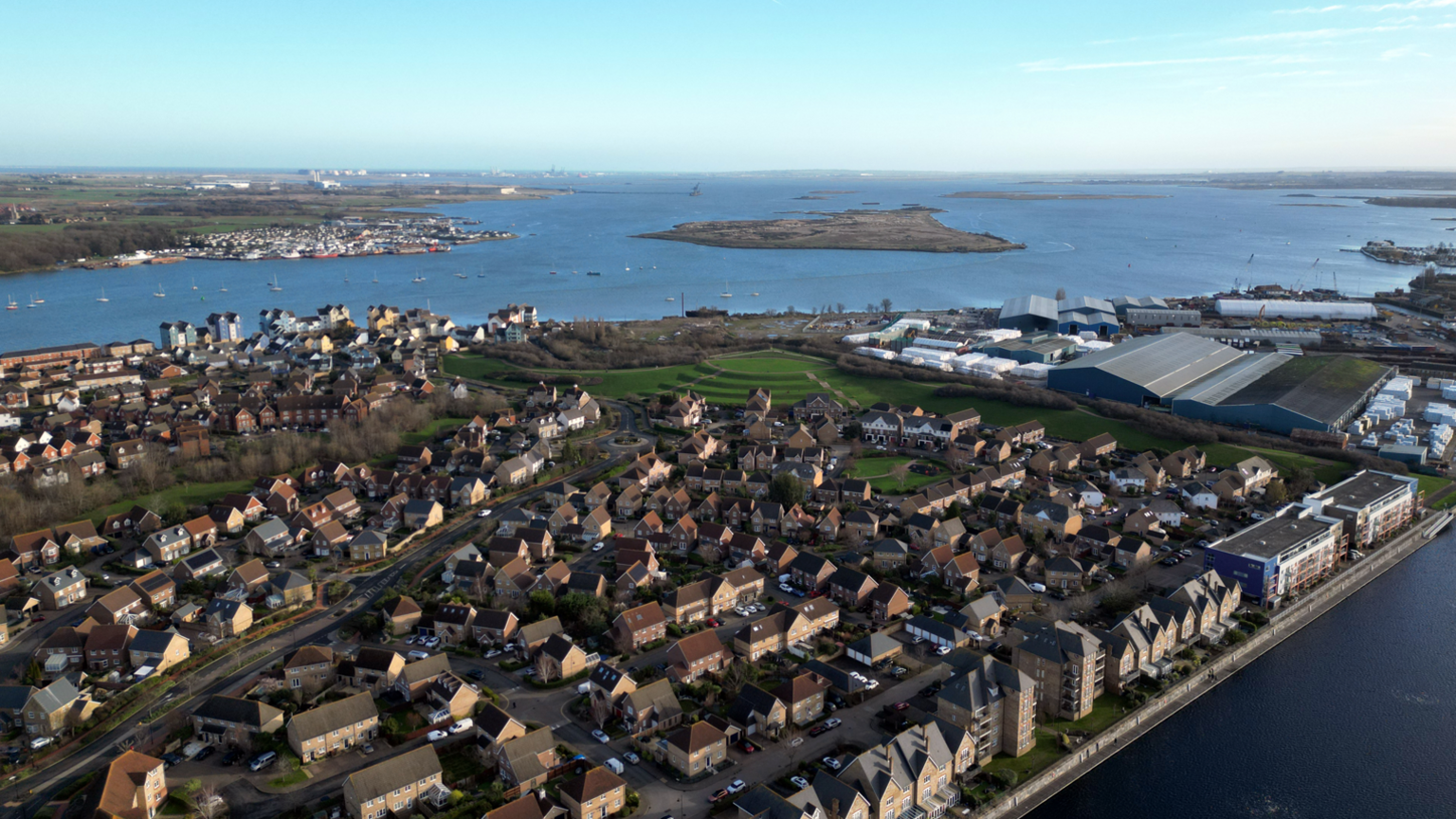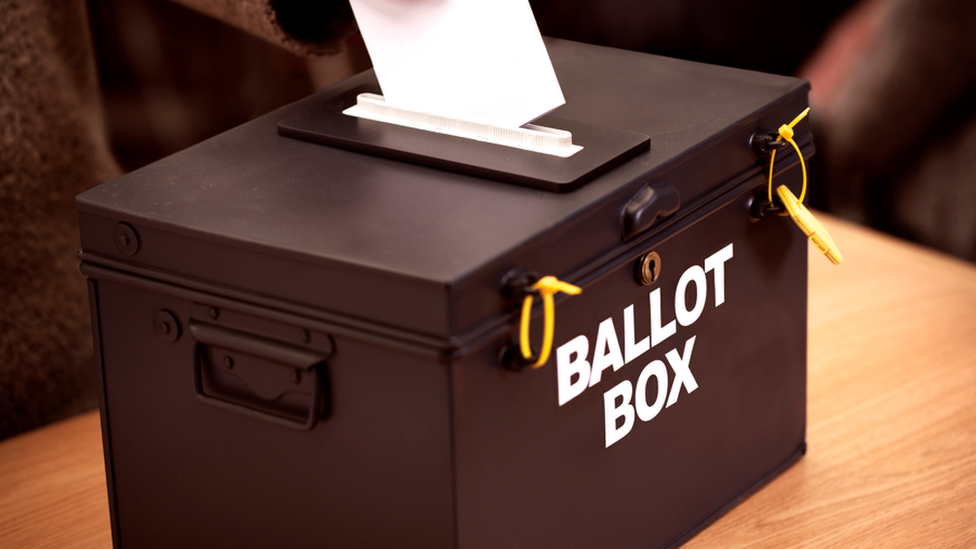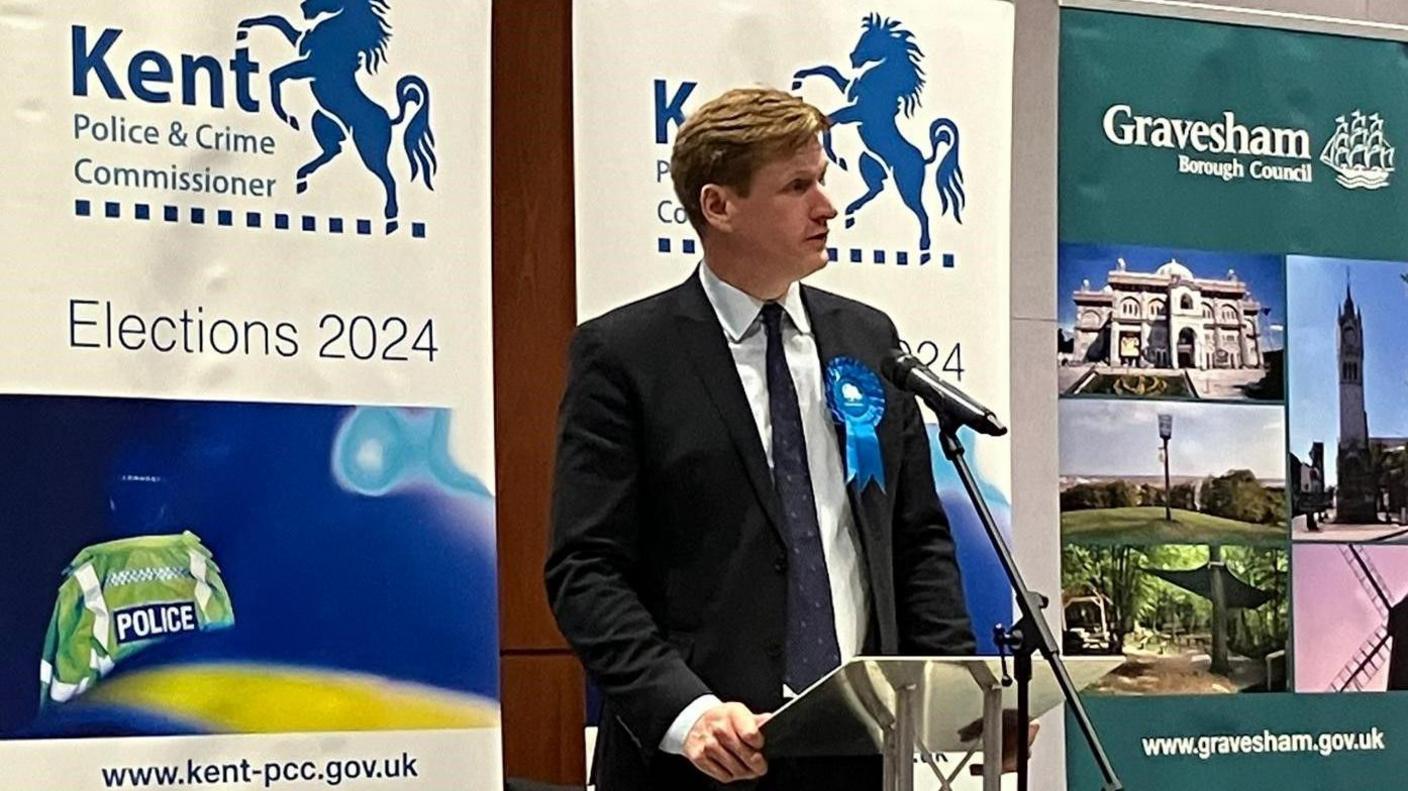What will the general election mean for Kent?

Kent voters will be heading to the polls on 4 July
- Published
Voters in Kent will head to the polls on 4 July to select 18 MPs to represent the county.
Five MPs are standing down - Tracey Crouch, Natalie Elphicke, Gordon Henderson, Greg Clark and Craig Mackinlay will not contest their seats.
A new constituency will be contested, Weald of Kent, which includes areas in Ashford, Maidstone and Tunbridge Wells.
Previously, nearly all Kent seats were won by Conservatives in 2019, except Canterbury where Rosie Duffield won for Labour.
Conservative Dover MP Natalie Elphicke defected to the Labour party in May.
Many voters will find they have a new constituency due to the 2023 Boundary Commission changes.
Here is a rundown of the constituencies:
Ashford
Conservative Damian Green won the seat in 2019 with a majority of more than 24,000. Labour finished in second place.
Conservatives have represented Ashford since 1885, aside from 1929 when Liberal Reverend Roderick Kedward took the seat.
Mr Green has been MP since 1997.
The new Ashford constituency covers less ground than it used to since the 2023 boundary review removed Tenterden.
It now stretches as far as Hawkinge.
Potential election issues include housing and transport infrastructure.
Canterbury
The only Kent seat won by Labour, Rosie Duffield turned Canterbury red in 2017 - the first time since the constituency was formed in 1918.
She won again in 2019 with an increased majority, which many said was due to the student vote.
The city centre, sewage and housing are all topics that are likely to come up during the campaign.
Chatham and Aylesford
This constituency has been held by Conservative Tracey Crouch since 2019, who announced in February she is to stand down due to personal reasons.
Labour and Conservatives have both won in the past few decades.
The seat now comprises wards in Chatham, Aylesford, Snodland and Walderslade.
It is likely to be highly contested.
The Conservatives lost control of Medway Council for the first time in 20 years at the recent local elections.
Town centre regeneration, crime and the cost of living are likely to be hot topics.
Dartford
Conservative Gareth Johnson won in 2019 with an increased majority of more than 18,000.
The seat has alternated between Labour and the Conservatives, and is considered a political bellwether - a trendsetter which mirrors the overall choice of the nation.
Transport infrastructure, such as the Lower Thames Crossing, could be a big issue in the campaign.
Dover and Deal
Dover and Deal could be one to watch.
Natalie Elphicke has held the seat for the Conservatives since 2019, but recently defected to the Labour Party.
Dover and Deal was previously held by her ex-husband Charlie Elphicke, who was elected in 2010 before standing down over sex assaults.
Ms Elphicke said she is not standing at the general election and the Conservative candidate is currently unknown.
Faversham and Mid Kent
The Faversham and Mid Kent seat has been held by Conservative Helen Whately since 2015.
Ms Whately won in 2019 with an increased majority of nearly 22,000. Labour came second.
The seat now includes some wards in Maidstone and Swale due to boundary changes.
Potential election issues include the NHS, the environment and schools.
Folkestone and Hythe
Damian Collins won the Folkestone and Hythe seat for the Conservatives with a majority of more than 21,000 in 2019.
Voters have elected a Conservative MP since the constituency's creation in 1950.
It is made up of urban and rural areas with a significant farming community, however the electorate has been reduced by the boundary changes.
Parts of the North Downs - stretching to Hawkinge - are now covered by Ashford.
Folkestone and Hythe District Council has been run by a minority administration of the Green Party and Liberal Democrats since 2023.
Sewage releases, planning issues and housing are likely to be big topics in the campaign.
Gillingham and Rainham
Since its creation in 2010, Gillingham and Rainham has been held by Conservative Rehman Chishti.
It replaced the previous constituency of Gillingham, which had been won by both Labour and the Conservatives.
It is a largely suburban area, where issues such as housing, planning and the NHS will likely be part of the campaign.
Gravesham
Gravesham has been represented by Conservative Adam Holloway since 2005.
He won in 2019 with a majority of nearly 15,000.
Formerly the Gravesend seat until 1985, the area has previously elected Liberal, Conservative and Labour MPs.
The NHS, high streets and crime are likely to be topics of debate in the campaign.
Herne Bay and Sandwich
New seat Herne Bay and Sandwich is made up of areas taken from other constituencies in the boundary changes.
It is largely made up from the previous North Thanet seat, which has been represented by Sir Roger Gale since 1983.
It also includes Herne Bay, Birchington, Westgate, Sandwich and Sturry.
Maidstone and Malling
Another new seat, Maidstone and Malling has changed significantly from the former Maidstone and The Weald constituency.
It is now largely made up of wards in Maidstone, with four wards from Tonbridge and Malling and two from Chatham and Aylesford.
Helen Grant, who has represented Maidstone and The Weald since 2019, will fight the seat again for the Conservatives.
It will also be contested by Maureen Cleator for Labour, Stuart Jeffery for the Greens, Mark Alexander for SDP, David Naghi for the Lib Dems and Paul Thomas for Reform UK. An official list of all the candidates will be published by 7 June.
Rochester and Strood
Rochester and Strood has been represented by Conservative Kelly Tolhurst since 2015.
The seat stretches across Medway including Cuxton, Rochester, and Strood.
It lost the Rochester South and Horsted ward to Chatham and Aylesford in the boundary review.
It has largely been represented by the Conservatives, although then-Tory MP Mark Reckless defected to UKIP in 2014.
Issues in this election are likely to be the NHS, development and the environment.
Sevenoaks
Sevenoaks has been represented by Laura Trott since she won with a majority of more than 20,000 in 2019.
Aside from Liberal Ronald Williams' victory in 1923, it has been held by the Conservatives and has been considered a safe seat.
The seat now stretches from Wilmington, south of Dartford, to Westerham due to boundary changes.
Potential election issues include housing developments and infrastructure.
Sittingbourne and Sheppey
The constituency has been represented by Conservative Gordon Henderson since 2010.
He won in 2019 with a majority of nearly 25,000 but he said he was "retiring" and will not stand at this election.
It is considered a new seat as the constituency has been reduced by the boundary changes, transferring the wards of Teynham and Lynstead, and West Downs to Faversham and Mid Kent.
Housing developments, environment issues and the NHS are likely to be hot topics.
Thanet East
This re-established seat will largely be made up of wards previously under South Thanet.
It has been represented by Conservative Craig Mackinlay since 2015.
Mr Mackinlay returned to Parliament in May to a standing ovation after suffering a life-threatening episode of sepsis which led to the amputation of his hands and feet.
After "36 hours of intense soul searching" he announced he was not seeking re-election.
Sewage releases, developments and Manston could be hot topics.
Tonbridge
Another re-established seat by the boundary review, Tonbridge now includes some areas in Dartford and Sevenoaks.
The constituency was formerly called Tonbridge and Malling, which has been represented by Conservative Tom Tugendhat since 2015.
He won in 2019 with a majority of nearly 27,000.
Tonbridge is made up of a large commuter population, which may make road and rail links potential election issues
Tunbridge Wells
Tunbridge Wells has been represented by Conservative Greg Clark since 2005.
Mr Clark won with a majority of nearly 15,000 in 2019 and the seat is considered safe for the conservatives.
The Liberal Democrats came second.
Mr Clark has announced he is standing down and not seeking re-election.
Tunbridge Wells is a largely rural area comprised of a number of towns and villages.
The town centre and housing are likely to be big issues in the campaign.
Weald of Kent
The Weald of Kent is a new seat, composed of wards in Ashford, Maidstone and Tunbridge Wells.
It is rural and includes Tenterden, Cranbrook, Headcorn and Yalding.
These are towns and villages long considered Tory heartland, so the Conservatives will be hoping to take it at the next election.
Damian Green had hoped to stand there but was blocked by local party members. He will stand in Ashford instead.
It will be contested by Katie Jane Lotte Lam for the Conservative and Unionist Party, Kate Walder for the Green Party, Daniel Kersten for Reform UK and John Howson for the Liberal Democrats. An official list of all the candidates will be published by 7 June.
What do the voters think?

Kin Coffee manager Jamie Pryor said he was pleased an election has been called
Jamie Pryor, manager of Kin Coffee in Staplehurst, said he was pleased an election has been called.
He said: “Policy wise I would just like to see them talk about real change and more opportunities for young people to make it easier for careers.
"I am hoping that young people get a fair chance within the working world and house prices come down to affordable levels where it is not just you are working your whole life just to get to a certain point.”

Corey Coates is voting in a general election for the first time
Corey Coates, an entrepreneur from Sittingbourne, is voting in a general election for the first time.
He said: “I think politicians don’t take young people seriously, especially with the rise of the Internet and the accessibility of information.
"Young people go and do their own research whereas the older generation perhaps are not as well informed on how to use a computer how to do their own independent research, so they are more easily manipulated.”

Jill Peart said she wants to see a change of government
Jill Peart in Sittingbourne said she wants to see a change of government.
She said: “The country is run down, we need more spending on education to help train people although I don’t know where all the extra teachers will come from."
What do you think are the main local issues in your area? Let us know on by messaging us on WhatsApp, external.
Follow BBC Kent on Facebook, external, on X, external, and on Instagram, external, Send your story ideas to southeasttoday@bbc.co.uk, external, or WhatsApp us on 08081 002250.
Related topics
- Published15 January 2024

- Published3 May 2024

- Published5 May 2024
